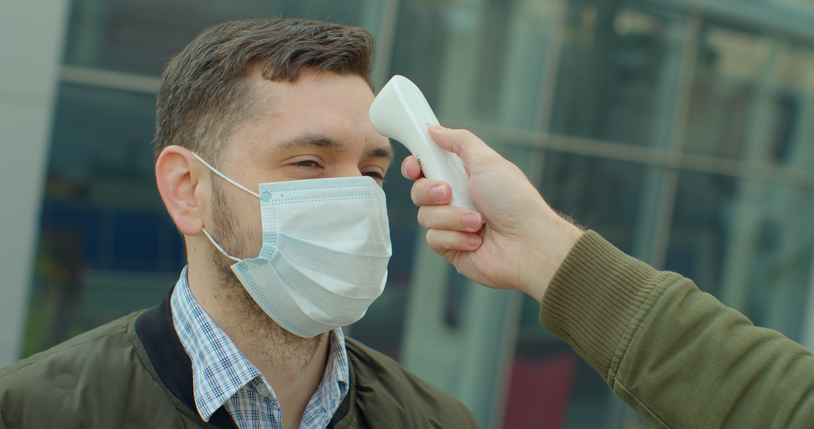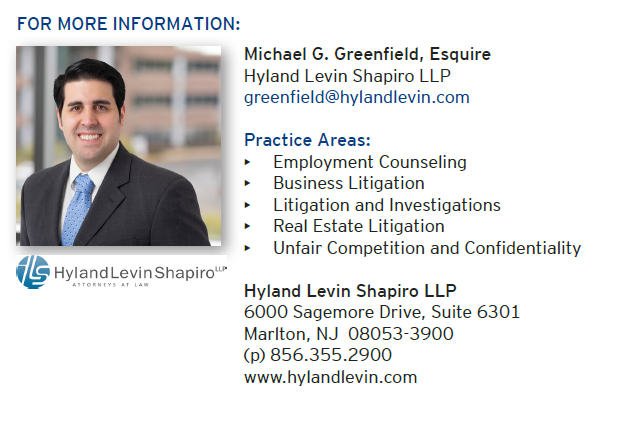 What should commercial landlords should know about tenant health screening questionnaires and temperature checks? As we turn towards the colder months and the start of flu season, Coronavirus infections are rising in states across the country prompting commercial landlords to wonder what steps can be taken to keep their tenants healthy and open for business.
What should commercial landlords should know about tenant health screening questionnaires and temperature checks? As we turn towards the colder months and the start of flu season, Coronavirus infections are rising in states across the country prompting commercial landlords to wonder what steps can be taken to keep their tenants healthy and open for business.
More and more commercial landlords are considering whether to take matters into their own hands and implement protocols, including health screening questionnaires and temperature checks for tenants, their employees, customers, vendors and guests. If done properly and effectively, such measures can help ensure a landlord’s tenants stay in operation and do so safely. However, there are many issues to consider and pitfalls to avoid for landlords seeking to implement health screenings, temperature checks and other public health measures. Without the guidance of counsel and proper consideration of the issues, landlords can face liability and hardship. Below are just some of the considerations for landlords to resolve before instituting health screenings and temperature checks.
Download Printable Article (PDF) >>>
The WHO, WHAT, WHERE and HOW of Tenant Health Screening
Health questionnaires provide one method of evaluating the health of tenants. Questionnaires should be created with the assistance of counsel as the Equal Employment Opportunity Commission (“EEOC”) has recently revised their guidance for what questions are, and are not, acceptable. All questionnaires must be applied evenly to all tenants to avoid allegations of discrimination or disparate treatment. Notice of the questionnaires, the effect of certain answers, and categories of heightened concern such as exposure to infected individuals or travel to so-called “hot spots” should be spelled out in polices provided to tenants before questionnaires are utilized.
Temperature checks present far more complicated issues and decisions:
Who Should Perform Temperature Checks
• If a landlord, and not the business tenant will perform temperature checks and/or monitors non-invasive screening equipment such as thermal cameras or scanners, the individuals performing such screenings should be properly trained on the use of the equipment as well as the protocols for what the EEOC considers to be a medical examination.
• The landlord’s representative taking the temperatures should wear personal protective equipment (“PPE”) and should administer the screenings so as to reduce close contact.
• An individual performing temperature checks also raises employment issues, including classification and wage issues that must be considered and resolved before any screenings can occur.
Who Should Have Their Temperatures Taken
• Will only tenants, i.e. employees, be screened or will the tenants’ customers, vendors, and guests also be screened?
• It is critical that temperate checks should be applied consistently and evenly. Testing only portions of a population such as customers, or only testing certain employees can lead to allegations of discrimination or even harassment. Having a policy that provides for who will be tested and if any differences in treatment are utilized, the rationale for such differences, is an important facet of any temperature screening plan.
Where Should Temperature Checks be Performed?
• Temperature checks should be a “first-level” screening and should occur prior to any interaction with others and prior to additional security measures.
• Landlords may consider use of a private screening area to ensure the privacy of those being tested and comply with potentially applicable EEOC requirements.
How Will Temperature Checks be Administered and What Happens to the Collected Information?
• When a temperature screening shows a fever, how the landlord will respond is critical. Landlords must decide if they will exclude the individual from the premises or if they will alert the tenant and have the tenant make the ultimate decision.
• What happens if an individual refuses to have their temperature taken upon entry or refuses to leave if they are exhibiting a fever?
• Perhaps the most critical aspect of temperature screenings is what is done with the temperatures that are recorded and collected. This information must remain confidential, and, ideally anonymous.
• What protocols are in place for individuals returning after an infection or displaying symptoms in order to gain entry to the property?
The above list is not an exhaustive one as there are other issues and concerns that would need to be addressed by landlords seeking to implement health screenings at their properties. Some landlords are even considering going a step farther to have their tenants tested for the Coronavirus. The anticipated vaccine(s) would also raise the issue of whether landlords could compel their tenants to get vaccinated before re-entering the property. As these issues are constantly evolving, sometimes on a daily basis, it is important that landlords have the advice of experienced counsel to avoid liability and support healthy and operational business tenants.
In addition to tenant health screening questionnaires and temperature checks, commercial landlords should also be prepared for:
• Situations where an outbreak occurs with their property – Being prepared for an outbreak at a property, and communicating that plan to tenants will avoid confusion, panic and allow for an orderly response.
• Distancing protocols – Landlords may consider reconfiguring their tenants’ spaces and also installing apparatuses that would promote social distancing between a tenants’ employees as well as between a tenant and their customers, vendors and guests.
• Building and Tenant Policies – While thinking about and discussing these and other Covid-related issues is a good practice, having the results of those thoughts and discussions reduced to written policies are a best practice. Having written policies leaves no doubts between landlords and their tenants, and allows landlords to effectuate their preferred way of addressing these issues. Policies can address the above topics as well as elevators, common areas, and face coverings.
The contents of this article are for informational purposes only and none of these materials is offered, nor should be construed, as legal advice or a legal opinion based on any specific facts or circumstances.



